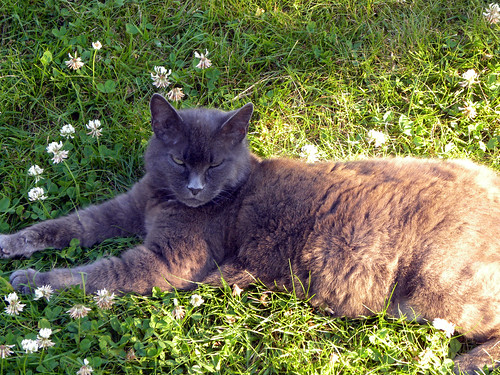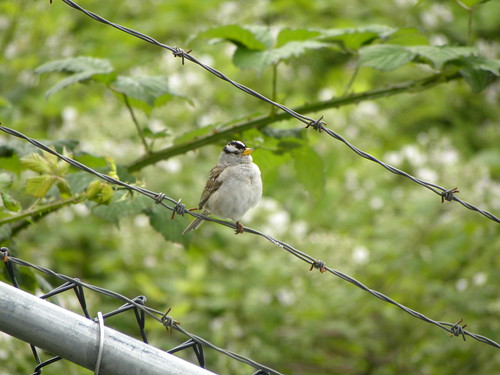It doesn’t get hot here as often or to the degree that it does in much of the U.S., and as a result comparatively few Vancouverites have air conditioning at home. When it’s hot, we turn on the fans, we run our clothes through the rinse cycle and wear them damp, we open the windows, drink iced drinks, and go outside. We sleep badly and swear we’ll get A/C for next year, and some of us actually do. If things keep heating up, everyone will probably install a chiller.
(My house tends to get five to ten degrees hotter than ambient, which is one of many reasons why I didn’t invite a bunch of people I’m meeting with tomorrow to do it here. Melting one’s friends is so gauche!)
Imagine, now, if you had fur! Rumble spends these days lying beside his friend the toilet. I stuck my foot in Minnow, a.k.a. jumpiest cat alive, the other morning, and she did not twitch a bun. And on the one day a couple weeks ago when it was absolutely scorching, I found many of the neighborhood cats snoozing in the shade, lying on lawns, and otherwise keeping cool by just damnwell getting out out. Here’s one:
So, heat. That particular searing day, maybe two weeks ago, K was wrapping up a project at her office and I spent the day in mine, drinking tons of water and sweating like crazy. I find a good bake, once in awhile, to be very gratifying, even healthy-feeling. It was a good day. And since then, it’s been a temperature many would find perfect: hot, but not too.
As we head into this weekend it looks to be heating up a bit more, back into the less comfy range. I probably won’t go out in search of more toasty felines, though–I have that day-long meeting Saturday, a hike with Barb on Sunday morning, and some work that’s crept up on me like one of those cartoon naturalists with a butterfly net. I dealt with as much of the pile as I possibly could today, but I don’t feel as though I’ve got very much think left in me for this evening.
What I do have in me is blueberries. My favorite local farmers have once again set up a booth in the Commercial Skytrain Station, and are selling cherries and blueberries for $2 a pound, or 3 pounds for $5. I shouldn’t be telling you this. I should be keeping it a carefully hoarded secret. I want all the blueberries, which are damn near as big as my thumb, and bursting with archived sunshine. But hiding this information from all of you, when several tens of thousands of commuters stream past these guys all day throwing money at them, would be silly. Go. Eat. They’re delicious.
Slightly related because it touches on my neighborhood and photography, I am thinking of sending a few pictures to the This Is East Van project. It wouldn’t pay, but as far as I can tell they aren’t one of those “you pay us to publish you!” scams that I’m more familiar with from seeing scammers pounce, hyena-like, on young poets. If anyone knows whether these guys are legit, I’d be interested. I haven’t published any photos since I was in some (electronic) Chicago-based Art magazine a few years back. This is because I don’t throw much effort at it. But if these guys aren’t crooks it would be nice to try. You’ve probably all noticed I’m really into my neighborhood, and if you’re not sure on that score, “The Cage” comes out on TOR.COM next week and should remove all doubt.
I will have the next Journey interview for you all early next week. In the meantime, here’s another cat.






